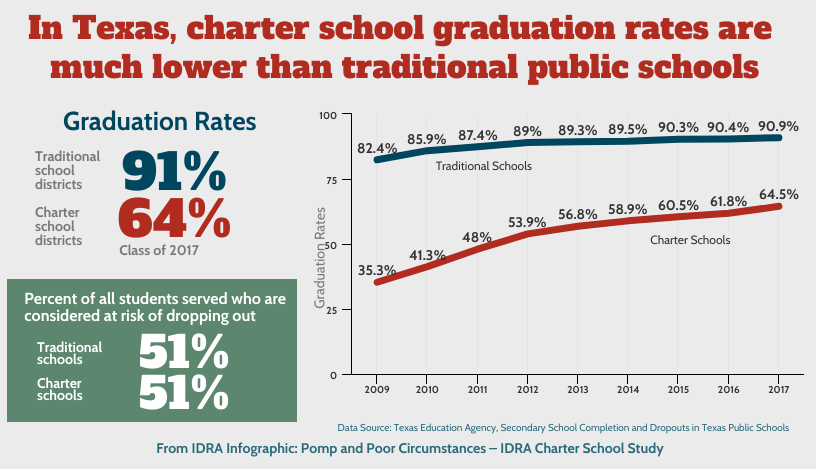Public funds should remain in public schools with public oversight from local communities. Yet, public monies are increasingly going to privately-run programs, like charter schools, with little public oversight or accountability. The loss of much-needed resources harms public school communities, students and families.
How do public funds get taken from public schools?
Several types of programs funnel public funds away from the schools that need them most, including the following.


While public schools must serve all eligible students, including English learners, students with school discipline records, and students receiving special education services, charters often engage in “creaming” strategies to avoid enrolling these students (Burris & Bryant, 2019; PEIMS, 2018-19).
At the same time, state funding for charter schools has ballooned in the past decade.
Voucher programs (including “microgrants,” education savings accounts and tax credit scholarships) divert public money to subsidize private schools or homeschool arrangements. IDRA and families across the state have successfully fought vouchers and other privatization efforts in the past so that Texas does not currently have a state-funded voucher system. We plan to keep it that way.
Voucher-like programs (i.e., Education Savings Accounts and Tax Credit Scholarships) similarly divert public money toward private education. These programs offer financial incentives for taxpayers and corporations to direct funds for private educational purposes that would otherwise go toward public schools.
Policy Recommendations for Texas
The Texas Legislature should…
- Ensure public funds have public oversight and are not used to support private interests, like privately-owned and operated charter schools, private schools, and voucher and voucher-like programs that do not serve the vast majority of students.
- End expansion of charter schools and hold existing charter schools to the same accountability standards as public schools in achievement, expenditures, student progress and enrollment.
- Ensure communities are involved in decision-making processes that impact their local public schools, including local and state-level processes about charter applications and amendments.
- Ensure that charter schools cannot “cream” students (selecting their preferred students based on academic achievement, English learner or special education designation or discipline history).
- Reject proposals for virtual voucher programs that would promote a private vendor-run education.
For more information, contact Dr. Chloe Latham Sikes, IDRA Deputy Director of Policy (chloe.sikes@idra.org) or Ana Ramón, IDRA Deputy Director of Advocacy (ana.ramon@idra.org).
References
Burris, C. (2020). Still Asleep at the Wheel: How the Federal Charter Schools Results in a Pileup of Fraud and Waste. New York, N.Y.: Network for Public Education. https://networkforpubliceducation.org/stillasleepatthewheel/
Burris, C., & Bryant, J. (2019). Asleep at the Wheel: How the Federal Charter Schools Program Recklessly Takes Taxpayers and Students for a Ride. New York, N.Y.: Network for Public Education. https://networkforpubliceducation.org/asleepatthewheel-2
Han, E.S., & Keefe, J. (2020). The Impact of Charter School Competition on Student Achievement of Traditional Public Schools after 25 Years: Evidence from National District-level Panel Data. Journal of School Choice, 1-39. https://www.tandfonline.com/doi/abs/10.1080/15582159.2020.1746621?journalCode=wjsc20
Hinojosa, D. (April 4, 2018). What the Research Says on Expanding High Quality Educational Opportunities for All Students – Testimony of IDRA presented for the Senate Education Committee. San Antonio, Texas: IDRA. https://www.idra.org/resource-center/what-the-research-says-on-expanding-high-quality-educational-opportunities-for-all-students/
Johnson, R. (2017). Annual Dropout and Longitudinal Graduation Rates in Texas Charter Schools, 2009-2016. Texas Public School Attrition Study, 2016-17. San Antonio, Texas: IDRA. http://www.idra.org/wp-content/uploads/2017/12/Annual-Dropout-and-Longitudinal-Graduation-Rates-in-Texas-Charter-Schools-2017-by-IDRA.pdf
TEA. (2020). Student Program and Special Populations Reports – 2018-2019. Austin, Texas: Texas Education Agency. https://rptsvr1.tea.texas.gov/adhocrpt/adspr.html
TEA. (2020). Summary of Finances. Austin, Texas: Texas Education Agency. https://tea.texas.gov/finance-and-grants/state-funding/foundation-school-program/summary-of-finances
TEA. (July 2019). Enrollment in Texas Public Schools 2018-19. Austin, Texas: Texas Education Agency. https://tea.texas.gov/sites/default/files/enroll_2018-19.pdf

